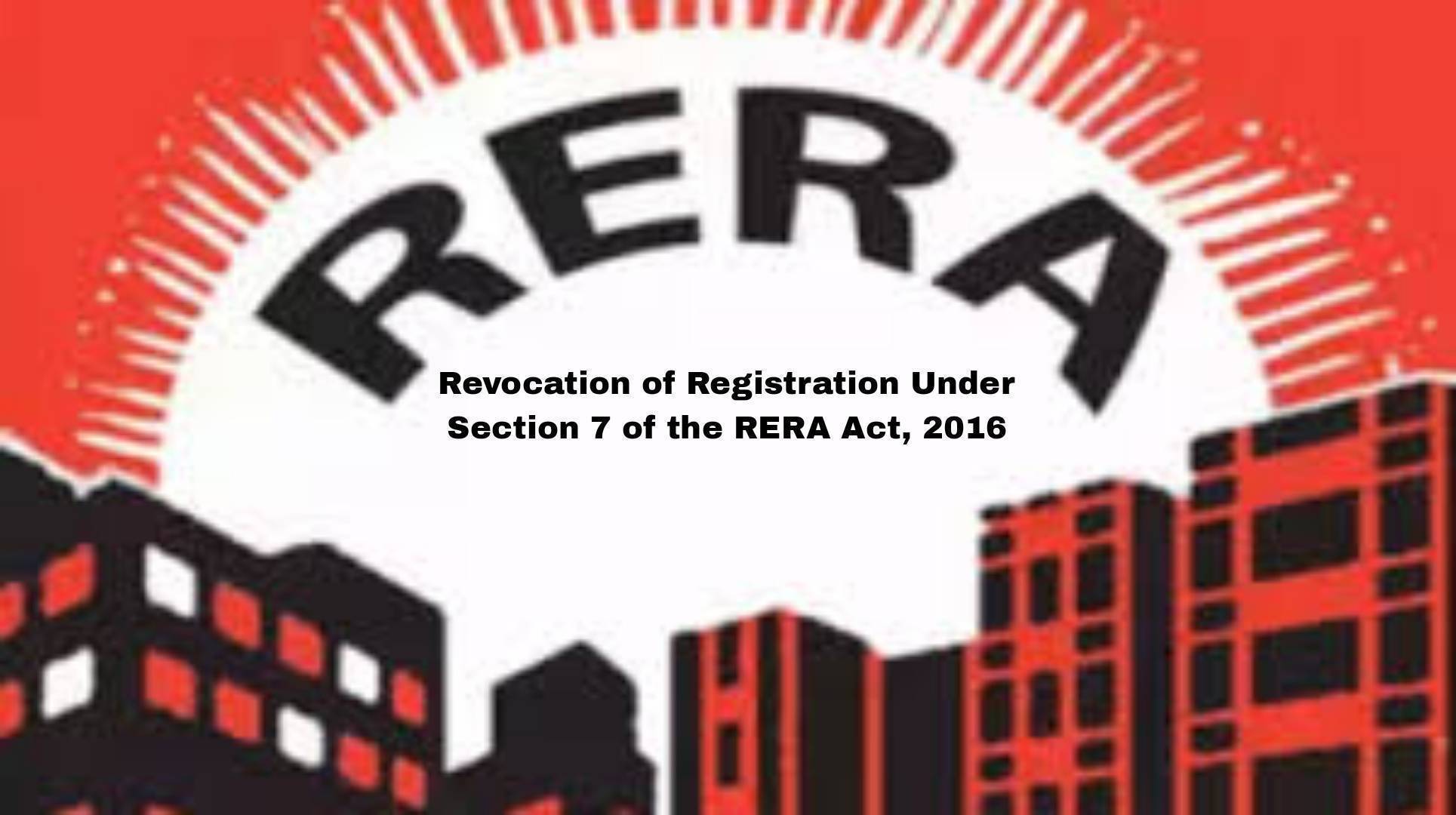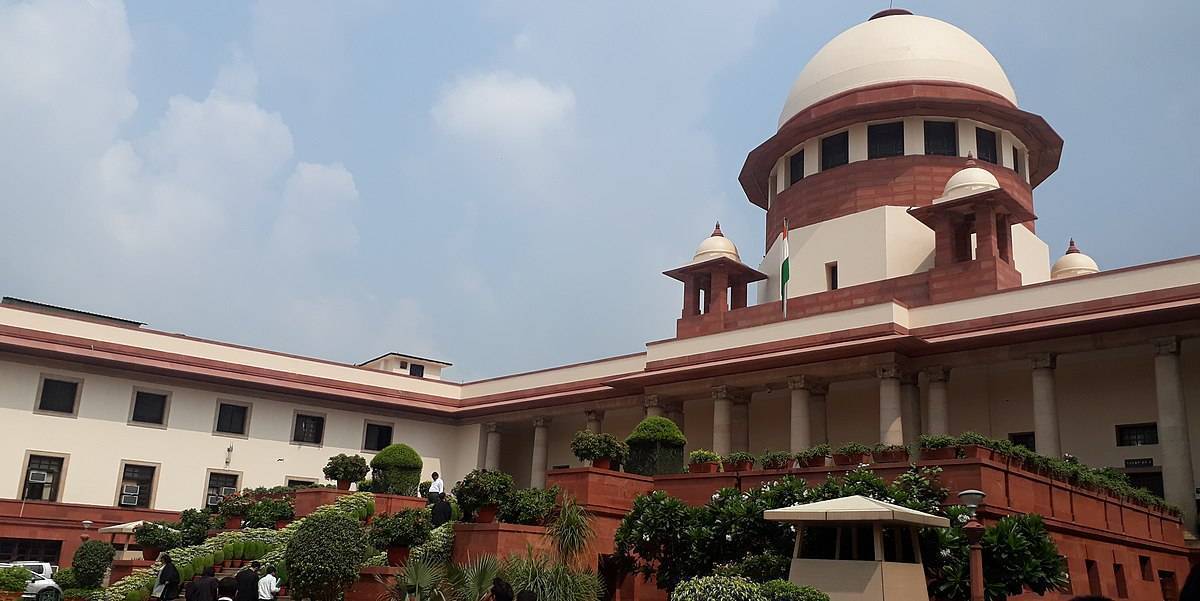The Real Estate (Regulation and Development) Act, 2016 (RERA) has streamlined the real estate sector in India by establishing a regulatory framework that aims to enhance transparency, accountability, and efficiency in the industry. One of the critical provisions under this Act is Section 7, which deals with the revocation of registration granted to promoters. This section empowers the RERA Authority to act as a vigilant watchdog, ensuring that promoters adhere to the stipulated norms and standards. Here, we delve into the specifics of Section 7, exploring the circumstances under which registration can be revoked, the procedure involved and the consequences.
Ground For Revocation: Understanding Section 7(1)(a) to (d) of the Real Estate (Regulation and Development) Act, 2016
Section 7(1)(a) to (d) of the Real Estate (Regulation and Development) Act, 2016 (RERA) delineates specific actions and violations that can lead to the revocation of a real estate project's registration. These provisions are pivotal in ensuring compliance, transparency, and accountability within the real estate sector.
Section 7(1)(a) of the Real Estate (Regulation and Development) Act, 2016 (RERA) details various defaults by a promoter that can lead to the revocation of their RERA registration.
1. Default in doing anything required by or under the Act, rules, or regulations: This includes various scenarios where the promoter fails to fulfill their obligations as mandated by the RERA Act, rules, or regulations. Some examples are:
a) Failure to utilize funds received for the real estate project: If the funds received for the project are diverted or misutilized, it constitutes a default under Section 4(2)(L)(D).
b) Failure to deliver possession of the real estate project within the agreed time: If the possession is not delivered within the stipulated time frame as per the agreement of sale with the allottees.
c) Failure to enter into an agreement of sale: If the promoter fails to enter into a formal agreement of sale with the buyers.
d) Failure to comply with orders of the Authority: Non-compliance with directives issued by the regulatory authority.
e) Failure to perform or comply with Section 11 of the Act: This section pertains to maintaining and depositing funds in a separate bank account for the real estate project.
2. Violates any of the terms or conditions of the approval given by the competent authority: This covers situations where the promoter breaches the terms or conditions of approval granted by the relevant authorities. Examples include:
a) Construction not in accordance with sanctioned plans: If the construction deviates from the plans approved by the authorities.
b) Construction causing hazards to the environment or inhabitants: If the construction poses risks to the environment or residents.
3. Involved in any kind of unfair practices or irregularities: This involves making false representations or engaging in deceptive practices to promote the sale or development of the real estate project. Examples include:
a) False representation of service standards: Making false claims about the quality or grade of the project.
b) False claims of approval or affiliation: Claiming to have approvals or affiliations that the promoter does not possess.
c) False or misleading representations concerning services: Providing misleading information about services offered.
Section 7(1)(b) of the Real Estate (Regulation and Development) Act, 2016 (RERA) pertains to situations where a promoter violates any of the terms or conditions of the approval given by the competent authority.
1. Construction not in accordance with sanctioned plans: If the construction of the real estate project deviates from the plans that were approved by the relevant authorities, it constitutes a violation under this provision. The approved plans serve as a blueprint for the project, and any deviations may compromise the safety, quality, or aesthetics of the project.
2. Construction causing hazards to the environment or inhabitants: If the construction activities pose risks to the environment or the safety of the residents, it amounts to a violation. This includes situations where the construction methods or materials used are hazardous or have adverse effects on the surrounding environment or the health of the inhabitants.
Section 7(1)(c) of the Real Estate (Regulation and Development) Act, 2016 (RERA) deals with situations where a promoter is involved in any kind of unfair practices or irregularities.
1. False representation of service standards: This occurs when a promoter falsely represents that the services provided in the real estate project meet a particular standard or grade. For example, claiming that the project is LEED certified or environmentally friendly when it does not meet the necessary criteria.
2. False claims of approval or affiliation: Promoters may falsely claim to have approvals or affiliations that they do not possess. For instance, misrepresenting membership in international real estate federations or groups to enhance credibility.
3. False or misleading representations concerning services: This involves making false or misleading statements about the services offered in the real estate project. For example, promising free maintenance for a certain period when it is not actually provided.
Section 7(1)(d) of the Real Estate (Regulation and Development) Act, 2016 (RERA) addresses situations where a promoter indulges in fraudulent practices.
1. Indulging in fraudulent practices: This provision encompasses various fraudulent activities carried out by promoters with the intention to defraud allottees or other stakeholders of the real estate project. Some examples include:
a) Ponzi schemes: Promoters may engage in Ponzi schemes where funds from new investors are used to pay returns to earlier investors, with the scheme ultimately collapsing when new investments dry up.
b) Multi-level marketing: Promoters may use multi-level marketing schemes to attract investors, promising high returns based on recruiting new participants into the scheme rather than legitimate product sales or services.
2. Buyback guarantee schemes: Promoters may offer buyback guarantees on investments without having any genuine financial planning or means to honor these guarantees.
3. Guaranteed returns on investments: Promoters may falsely promise guaranteed returns on investments without adequate financial backing or risk assessment.
Procedure for Revocation
The process of revocation involves several steps designed to ensure fairness and due process:
1. Initiation: The revocation process can be initiated either on the receipt of a complaint from an aggrieved party or suo motu by the Authority.
2. Notice Period: Before revoking the registration, the Authority must issue a 30-day notice to the promoter. This notice, issued in Form “D,” provides the promoter an opportunity to present their case and show cause as to why the registration should not be canceled.
3. Hearing and Decision: The promoter is given a fair hearing to justify their actions. Based on the evidence and explanations provided, the Authority decides whether to revoke the registration or allow it to continue with certain conditions imposed.
Consequences of Revocation
The revocation of registration has significant repercussions for the promoter and the project. As per Section 7 of the RERA Act, the following actions are mandated upon revocation:
1. Debarment from Project Involvement:
Upon the revocation of registration under RERA, the promoter faces the consequence of being debarred from any further involvement in the project. This measure effectively halts their participation in the project's development, marketing, or any other related activities. By imposing this restriction, RERA ensures that promoters who have failed to comply with its regulations cannot continue to influence the project, thus safeguarding the interests of homebuyers and the public from any further potential harm or misconduct.
2. Listing as a Defaulter:
Another significant consequence of revocation is the listing of the promoter's name as a defaulter. This action carries significant reputational implications for the promoter within the real estate industry. Being listed as a defaulter can damage the promoter's credibility and hinder their ability to secure future projects or collaborations. This serves as a strong deterrent against non-compliance or misconduct among promoters, as the repercussions extend beyond immediate project-related consequences to long-term professional standing.
3. Freezing of Bank Accounts:
In addition to debarment and listing as a defaulter, the RERA Authority freezes the bank accounts associated with the revoked project. This preventive measure aims to mitigate the risk of any potential misuse or diversion of funds allocated for the project. By freezing these accounts, RERA ensures that the funds are safeguarded and used only for purposes compliant with its regulations, thus protecting the financial interests of homebuyers and preventing any further financial irregularities or mismanagement.
4. Communication to Other RERA Authorities:
Upon revocation, the RERA Authority communicates the decision to other state RERA authorities. This ensures that the promoter's actions and the revocation itself are known and monitored on a broader scale. By sharing this information with other authorities, RERA prevents promoters from potentially engaging in similar activities or projects in different regions without being held accountable for their past actions. This cross-jurisdictional communication reinforces the accountability and integrity of the regulatory framework established by RERA.
Conclusion
The provision for revocation of registration under Section 7 of the RERA Act, 2016, underscores the regulatory framework’s commitment to protecting consumer interests and ensuring fair practices in the real estate sector. By empowering the RERA Authorities to take stringent actions against defaulting promoters, the Act aims to foster a more transparent, accountable, and investor-friendly environment. While the process and consequences of revocation are indeed severe, they serve as a necessary deterrent against malpractices, thereby promoting the overall health and growth of the real estate industry in India.
Cover image - https://timesofindia.indiatimes.com









.png)